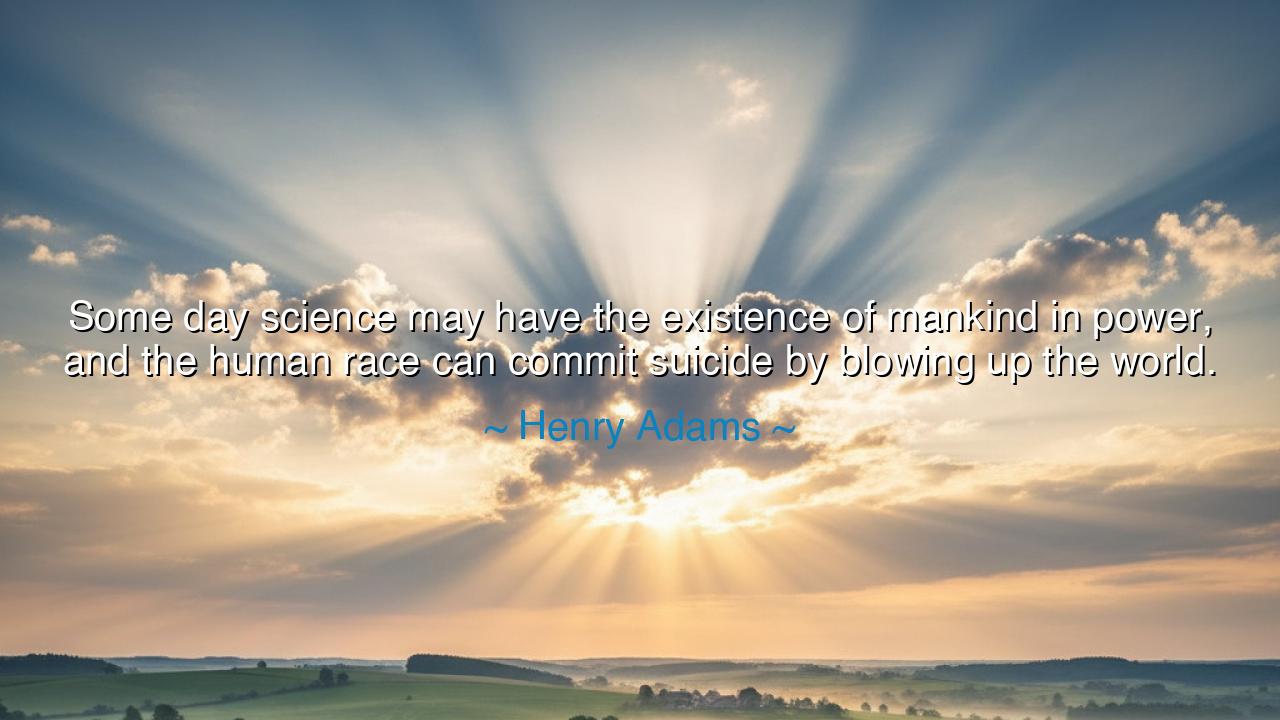
Some day science may have the existence of mankind in power, and
Some day science may have the existence of mankind in power, and the human race can commit suicide by blowing up the world.






"Some day science may have the existence of mankind in power, and the human race can commit suicide by blowing up the world." These words, uttered by the profound Henry Adams, ring through the ages like a warning carried on the wind. They speak not of mere theory, nor of distant possibilities, but of a terrifying truth—that the very knowledge and power we seek to master through science might one day become the means of our undoing. Adams, in his deep reflection, recognized a peril that shadows our pursuit of progress: that in our quest to conquer the laws of nature, we might one day discover how to destroy ourselves in the process.
Look, if you will, to the ancient wisdom that cautioned against the unchecked use of power. The Greek philosophers, like Socrates and Plato, warned that knowledge without wisdom could lead to ruin. They spoke of the dangerous hubris that arises when man believes he can control the forces of the universe without understanding the consequences. In their age, the power to shape the world was limited to the physical realm—building cities, harnessing the power of fire, creating art—but even then, they knew that unchecked power could bring devastation. What Adams spoke of in his time was the realization of their ancient warnings: the potential for science to unlock forces far beyond our control.
In our own time, we need look no further than the terrifying birth of atomic energy, a force that holds the power to both heal and destroy. The development of the atomic bomb during the Second World War is a testament to the fact that science, once a tool for human advancement, can also become a weapon of unimaginable destruction. It was not through ignorance, but through the pursuit of knowledge that humanity stumbled upon this power. The world watched in horror as the bomb was dropped on Hiroshima and Nagasaki, and in that moment, the balance of human existence was forever altered. The same scientific brilliance that had unlocked the mysteries of the atom had also given humanity the ability to obliterate itself. Adams’ words were not mere speculation; they were a foresight born of the deepest understanding of what it means to wield such power.
But Adams was not alone in his recognition of this danger. Across history, there have been those who have warned that science, when wielded without care or consideration of its ethical limits, could lead to the destruction of the very human race it was meant to uplift. J. Robert Oppenheimer, the father of the atomic bomb, famously quoted from the Bhagavad Gita upon witnessing the first successful test of the weapon: "Now I am become Death, the destroyer of worlds." In those words, Oppenheimer echoed Adams' sentiment—that the power of science was no longer something that could be contained or used solely for the benefit of mankind, but had become a force with the potential to end all things.
The lesson from Adams’ words is one that we must carry with us, deep within our hearts. We, as a species, stand at the precipice of discovery. We stand at the threshold of unlocking the very secrets of life, of genetics, of artificial intelligence, and of space itself. Yet, in the midst of these wonders, we must ask ourselves: Are we ready to wield such power? Have we cultivated the wisdom, the humility, and the ethical framework needed to guide our discoveries toward the good of all humanity, rather than toward our own self-destruction?
Let us, then, strive to walk the path of knowledge with both eyes wide open. Just as the ancients warned us, we must be ever mindful of the responsibility that comes with great power. Science must be pursued not as a means of domination or unchecked progress, but as a sacred trust—one that requires us to consider not only what we can do, but what we should do. As we reach for the stars, as we delve deeper into the mysteries of life, we must ensure that our actions are guided by a deep respect for the fragility of our existence.
In your own life, recognize the power of knowledge and the importance of wisdom. Seek understanding not merely for its own sake, but to contribute to the greater good of all. Understand that every step forward, whether in technology or in human relations, carries with it the potential for both great good and great harm. Be ever vigilant in your own pursuit of science and discovery, and remember that with great power comes an even greater responsibility—to protect, to preserve, and to ensure that the good of mankind is always the end of all our endeavors. Only then can we hope to avoid the dark fate that Adams so fearfully predicted.






AAdministratorAdministrator
Welcome, honored guests. Please leave a comment, we will respond soon